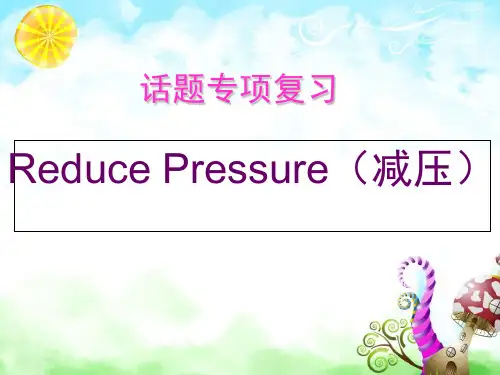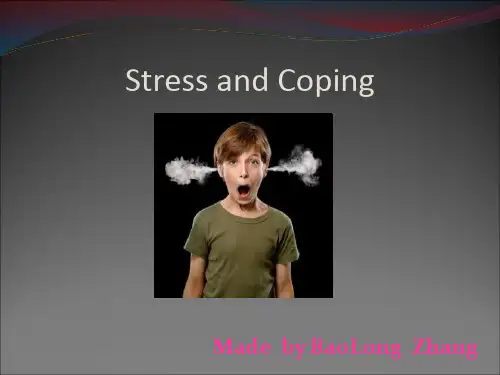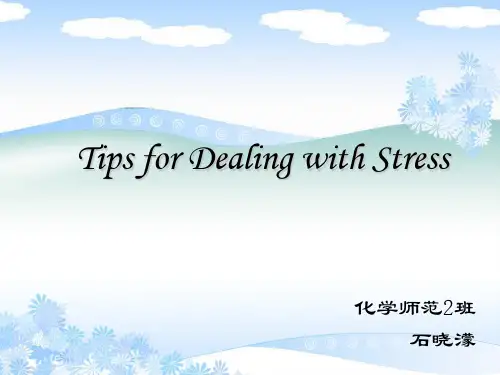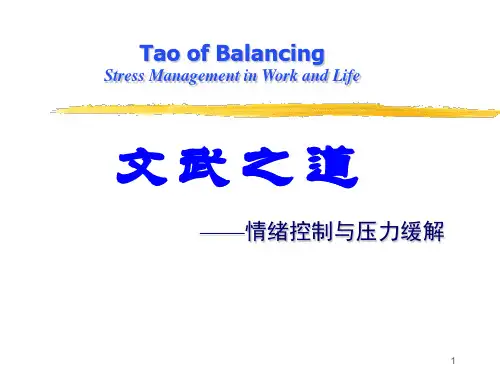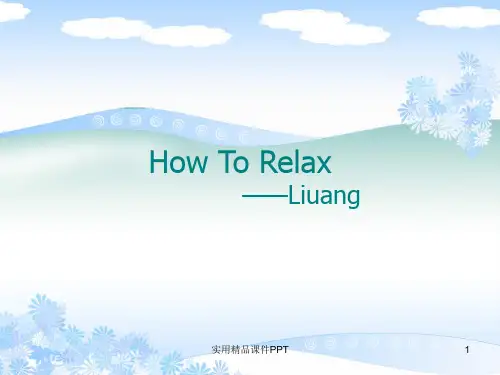英语——缓解压力ppt课件
- 格式:ppt
- 大小:1008.50 KB
- 文档页数:10
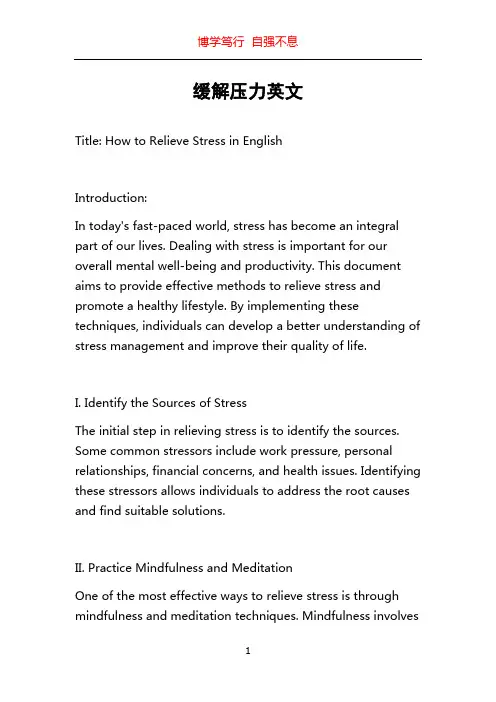
缓解压力英文Title: How to Relieve Stress in EnglishIntroduction:In today's fast-paced world, stress has become an integral part of our lives. Dealing with stress is important for our overall mental well-being and productivity. This document aims to provide effective methods to relieve stress and promote a healthy lifestyle. By implementing these techniques, individuals can develop a better understanding of stress management and improve their quality of life.I. Identify the Sources of StressThe initial step in relieving stress is to identify the sources. Some common stressors include work pressure, personal relationships, financial concerns, and health issues. Identifying these stressors allows individuals to address the root causes and find suitable solutions.II. Practice Mindfulness and MeditationOne of the most effective ways to relieve stress is through mindfulness and meditation techniques. Mindfulness involvesbeing present in the moment, observing thoughts and feelings without judgment. Meditation, on the other hand, is a practice that helps calm the mind and relax the body. By incorporating mindfulness and meditation into daily routines, individuals can reduce stress levels and improve overall well-being.III. Engage in Physical ActivityRegular physical activity plays a vital role in stress relief. Exercise releases endorphins, the body's natural stress-relieving chemicals, which help elevate mood and reduce anxiety. Engaging in activities like walking, jogging, dancing, or participating in sports can significantly reduce stress levels and promote a sense of relaxation.IV. Maintain a Healthy LifestyleMaintaining a healthy lifestyle can greatly contribute to stress relief. This includes eating a balanced diet, getting sufficient sleep, and avoiding excessive caffeine and alcohol consumption. A nutritious diet helps to nourish the body and mind, while adequate sleep allows for proper rejuvenation. Avoiding excessive caffeine and alcohol helps in maintaining stable energy levels and preventing mood swings.V. Develop Effective Time Management SkillsEffective time management skills can alleviate stress by providing individuals with a sense of control over their lives. By prioritizing tasks, setting realistic goals, and avoiding procrastination, individuals can better manage their time and reduce stress levels. Breaking larger tasks into smaller, manageable steps can also help in preventing overwhelming feelings.VI. Cultivate Supportive RelationshipsBuilding and maintaining supportive relationships is essential for stress relief. Sharing concerns and seeking support from trusted friends, family, or support groups can provide emotional comfort and perspective. Having a strong support system helps in navigating through challenging times and alleviating stress.VII. Practice Relaxation TechniquesRelaxation techniques, such as deep breathing exercises, progressive muscle relaxation, and aromatherapy, can help reduce stress and induce a state of relaxation. Deep breathing exercises involve taking slow, deep breaths in through the nose and exhaling through the mouth, allowing the body to relax. Progressive muscle relaxation involves tensing and then releasing various muscle groups to promote relaxation. Aromatherapy involves the use of essential oils to create a calming ambiance.VIII. Implement Stress-Relief Strategies in the WorkplaceWorkplace stress can have a significant impact on overall well-being. To combat stress at work, individuals can implement strategies such as taking regular breaks, organizing and prioritizing tasks, and practicing stress-reducing techniques during breaks. Additionally, open communication with supervisors or colleagues can help address work-related stressors.Conclusion:Stress is a common part of life, but it is essential to find effective ways to relieve and manage it. By practicing mindfulness, engaging in physical activity, maintaining a healthy lifestyle, and cultivating supportive relationships, individuals can significantly alleviate stress levels. Implementing stress-relief strategies in everyday life, including the workplace, can lead to improved well-being, increased productivity, and a happier and more fulfilling life.。
